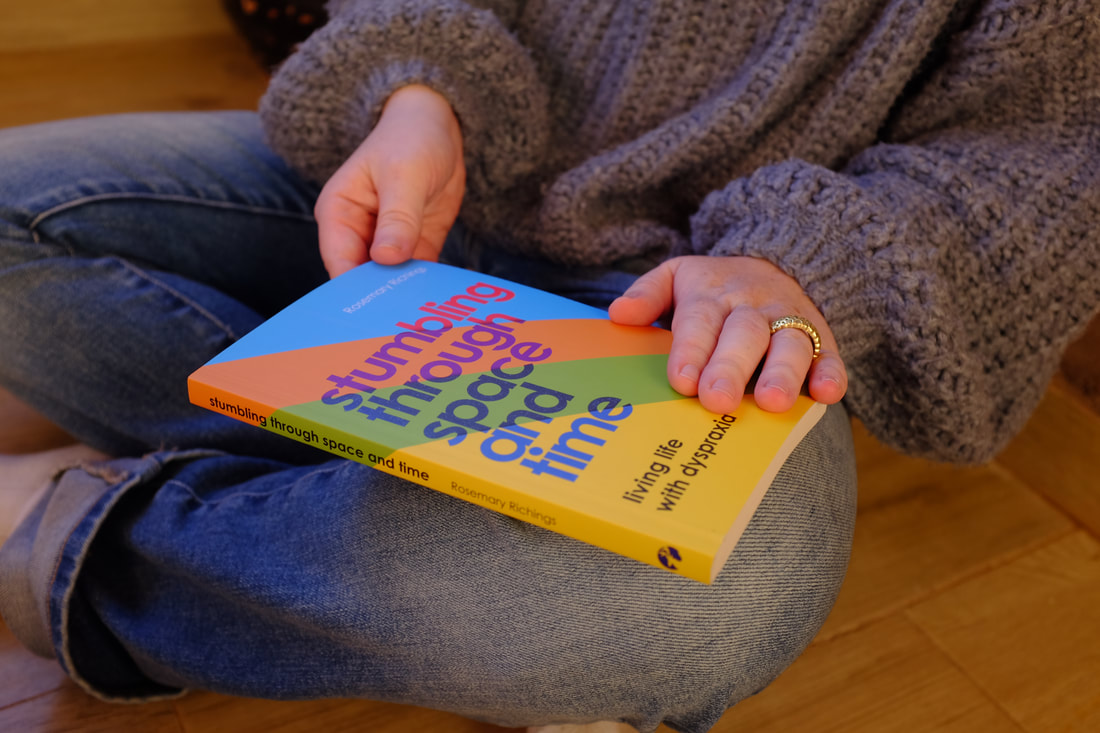Hi, I'm Rosemary aka Rosie:A writer, editor, and public speaker that helps people create and distribute information on neurodiversity, disability, and chronic illness. Typically, I keep disabled peoples' best interests in mind by prioritising accessibility and offering a non- patronising, equitable viewpoint of disabled lived experiences.
I am also the author of Stumbling Through Space and Time: Living Life With Dyspraxia, a book that uses my own lived experiences as a dyspraxic person to educate people about dyspraxia. Currently, I am working on my second book, a guide to navigating university as a dyspraxic student. Where am I based?Although I'm originally from Toronto, Canada, I moved to Marrakech (Morocco) in the fall of 2021 to accommodate the European Time Zone needs of my husband James, a WHO consultant for the Global Diabetes Compact.
These days, I divide up my time evenly between Morocco and Canada. My typical clientele is a mixture of British, Canadian, and American publications and businesses. If you're curious what time zone to plan around, I am on Casablanca time (GMT+1) when I am in Morocco, and Eastern standard time (EST) when I am in Canada. When I work remotely from cities outside of Canada and Morocco, all clients I am working with at that point in time will be notified ahead of time to enable transparent and productive communication. /
Rosemary is a delight to work with and her work is rewarding to edit. She sets the stage well, does her research, and brings a needed perspective to the table. Her story for Medicinal Media on sensory processing issues and apps has inspired our readers and we're so grateful for her words and voice.
|
How my perspective can help youI tackle subjects that affect disabled people with a great deal of sensitivity and dignity because it has always directly affected my life. I knew I was neurodivergent by age 4, had my first iron deficiency fainting spell by age 13, and am a recent hypothyroidism diagnosis. My disabled lived experience perspective typically attracts the following clientele:
How I talk about disability...I am a firm believer in the disability community principle of "nothing for us without us, along with the social model of disability. The social model, which was created by disabled people states that disabled people are disabled by barriers in society not by their impairment or difference. Through careful research and direct conversations with members of the disabled community, I tackle issues that affect disabled people.
All you have to do is follow me on social media to find out that I am very outspoken about my experiences as a disabled person, but I also recognise that not everyone's experiences are the same as mine. Being a voice of a historically marginalised community makes me feel like I must approach every story with an open-mind and no assumptions whatsoever. Overall, what keeps me grounded in the reality of being a disabled person on a global scale is my ongoing involvement in disability advocacy. Every client has the added bonus of working with someone who has media experience in a variety of mediums, and a great deal of familiarity with what makes content do well on search engines and on social media. Previously, I have made media appearances in print, on Instagram, on live streams, and on podcasts.
|
My past experiences... |
Examples of topics I have covered: |
|
My digital marketing experiences trace back to 2009 when I started running my own blog and doing marketing work for organisations such as Parks and Recreation, The Toronto Fringe Festival, and Shakespeare In Action. I have also been involved in the editorial efforts of two university newspapers, and created my first ever zine when I was 21 years old.
I have an English and Drama Studies degree from York University, took Editing for Print and Digital Publications courses at George Brown College, and I'm a former student of University Of Toronto's Summer Writing School. I have also participated in arts mentorship programs at The Toronto Fringe Festival, Soulpepper Theatre, and Tarragon Theatre. For a more detailed overview of my past experiences, check out My CV and/or my LinkedIn Profile. I am an experienced freelancer who has been taking on new projects since 2014. I have worked with clients such as E-Bay, Yellowpages, Lexxic, and Uptimize, and my work has been featured in magazines such as Reader's Digest and Travel and Leisure. A lengthier list of my past clients is available on my clients page. |
Not sure what topics to assign to me? Thinking of commissioning me for a project and I haven't previously pitched you an idea before? Here are a few examples of the topics I am frequently asked to cover in all aspects of my work. Feel free to contact me for a project commission with a similar focus:
|
What do I typically offer?
For more info about what sets me apart from other freelancers, check out my hire me page.
Media inquires:
As an author always looking for opportunities to introduce my work to new audiences, I'll also occasionally accept press invites to be interviewed for live streams, podcasts, radio shows, articles, and other forms of media.
Previously, I been a guest on disability and neurodiversity podcasts such as the Neurodiversity Podcast, The All 4 Inclusion Podcast, and Neurodiverging Podcast, been featured in Girls Interrupting's International Women's Day campaign, and been interviewed for The Disabled Feminist Newsletter, NYC Daily Post, and Werk Magazine.
Previously, I been a guest on disability and neurodiversity podcasts such as the Neurodiversity Podcast, The All 4 Inclusion Podcast, and Neurodiverging Podcast, been featured in Girls Interrupting's International Women's Day campaign, and been interviewed for The Disabled Feminist Newsletter, NYC Daily Post, and Werk Magazine.
What you need to know about my book...
My book is available through Jessica Kingsley Publishers (JKP), part of the John Murray Press Division of Hachette UK.
Stumbling Through Space and Time: Living Life With Dyspraxia's international English language debut was September 21, 2022, and the book is available in bookstores in North America, the UK, Ireland, Europe, New Zealand, Australia, some parts of Asia and Africa, and popular online book retailers such as Bookshop and Amazon.
Since its release, the book has been proudly loved and endorsed by Neurodiversity at Oxford, Dyspraxia Reddit, Dyspraxia DCD America, Sensory Integration Education's Sensory Awareness Guide, Dyspraxia Foundation's resource page, and Dyspraxic Adults: A Forum For Adults With Dyspraxia.
It has also featured in health and well-being library catalogues such as The Wellington City Library's Good Health collection, the Edinburgh Napier University Well-Being Collection, and Denver Public Library's Celebrating Neurodiversity: Books For Adults book recommendation list. During a 2023 reading challenge, my book was a Books by Authors With a Non-apparent Disability category staff pick at my hometown library, Toronto Public Library.
Here is JKP's official premise:
"Rosemary shares her experience of growing up dyspraxic, and how it impacts her sense of space, time and co-ordination. Diagnosed with DCD at the age of four, Rosemary shares her insights and experience dealing with challenges, from coping with bullies in school to choosing a dyspraxia-friendly university, pursuing self-employment and travelling abroad.
Rosemary shares guidance for others about what helped her develop her skills, including ballet and gymnastics, the Wilbarger Protocol (brushing therapy) and equestrian therapy. Full of practical tips and insights into the strategies that gave Rosemary the confidence to succeed, this is an essential guide for other dyspraxics and those supporting them, which shows you how you too can thrive as a dyspraxic person."
Stumbling Through Space and Time: Living Life With Dyspraxia's international English language debut was September 21, 2022, and the book is available in bookstores in North America, the UK, Ireland, Europe, New Zealand, Australia, some parts of Asia and Africa, and popular online book retailers such as Bookshop and Amazon.
Since its release, the book has been proudly loved and endorsed by Neurodiversity at Oxford, Dyspraxia Reddit, Dyspraxia DCD America, Sensory Integration Education's Sensory Awareness Guide, Dyspraxia Foundation's resource page, and Dyspraxic Adults: A Forum For Adults With Dyspraxia.
It has also featured in health and well-being library catalogues such as The Wellington City Library's Good Health collection, the Edinburgh Napier University Well-Being Collection, and Denver Public Library's Celebrating Neurodiversity: Books For Adults book recommendation list. During a 2023 reading challenge, my book was a Books by Authors With a Non-apparent Disability category staff pick at my hometown library, Toronto Public Library.
Here is JKP's official premise:
"Rosemary shares her experience of growing up dyspraxic, and how it impacts her sense of space, time and co-ordination. Diagnosed with DCD at the age of four, Rosemary shares her insights and experience dealing with challenges, from coping with bullies in school to choosing a dyspraxia-friendly university, pursuing self-employment and travelling abroad.
Rosemary shares guidance for others about what helped her develop her skills, including ballet and gymnastics, the Wilbarger Protocol (brushing therapy) and equestrian therapy. Full of practical tips and insights into the strategies that gave Rosemary the confidence to succeed, this is an essential guide for other dyspraxics and those supporting them, which shows you how you too can thrive as a dyspraxic person."
Want to translate and publish my book in another language?
If you publish books in another language besides English, and want to apply for foreign rights and translation privileges (or you know someone who is interested in doing that), contact my publisher directly.





